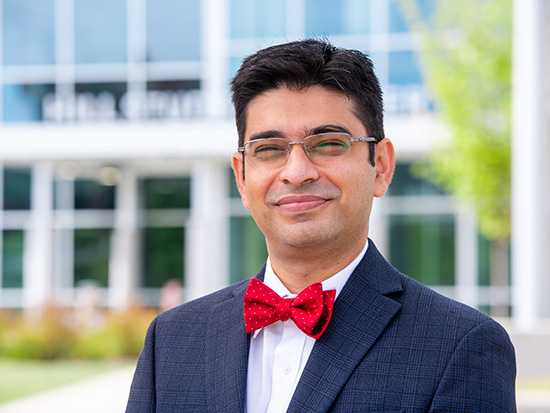 UAB’s Vikas Dudeja will serve as the principal investigator for a $2 million grant to continue research on liver cancer. Vikas Dudeja, M.D., director of the University of Alabama at Birmingham’s Division of Surgical Oncology, has been listed as the principal investigator on a four-year $2 million liver cancer research grant from the Department of Defense.
UAB’s Vikas Dudeja will serve as the principal investigator for a $2 million grant to continue research on liver cancer. Vikas Dudeja, M.D., director of the University of Alabama at Birmingham’s Division of Surgical Oncology, has been listed as the principal investigator on a four-year $2 million liver cancer research grant from the Department of Defense.
“We are studying the factors associated with recurrence of hepatocellular carcinoma, the most common form of liver cancer,” Dudeja said. “For patients with early localized HCC, removal of the cancer using surgical approaches is the treatment of choice. Unfortunately, despite surgical intervention, the cancer can come back in up to 60 percent of these patients.”
Dudeja says, if there were a test to predict who is at a greater risk of the cancer’s coming back, they could follow the patient closely to catch the cancer recurrence early. These patients with higher risk of disease recurrence will also be candidates for clinical trials for novel treatments.
“Our lab and others have found that the bacteria in our gut can affect cancer growth as well as the efficacy of therapies used to treat cancer,” Dudeja said. “These bacteria can be detected using next generation sequencing tests on stool samples from patients.”
With this grant, Dudeja and his team are planning to study the bacterial signatures in the gut of patients with HCC to determine whether there are specific bacteria that can predict the recurrence of cancer after it has been removed surgically.
“At UAB Surgery, we take care of many patients with HCC every year, and this grant gives us an opportunity to address a significant challenge facing our patients.”
Dudeja, with UAB serving as the lead site, will work with partnering principal investigator Adam Yopp, M.D., of the University of Texas Southwestern. Patients are expected to be recruited into the study later this year.
